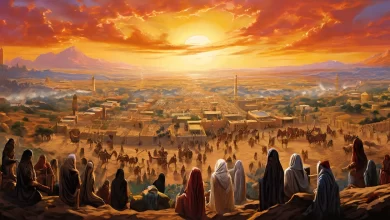The Celestial Dimension and Angels
We live in a world that, for most of us, is defined by what we can see, touch, hear, and feel. Material reality is tangible and immediate, governed by the laws of physics and nature that we have learned to understand over the centuries. However, the Bible reveals to us that there is another dimension, invisible to our physical eyes, but no less real. A dimension where time and space converge in an eternity that transcends our limited understanding. It is in this spiritual realm that extraordinary beings, known as angels, live.
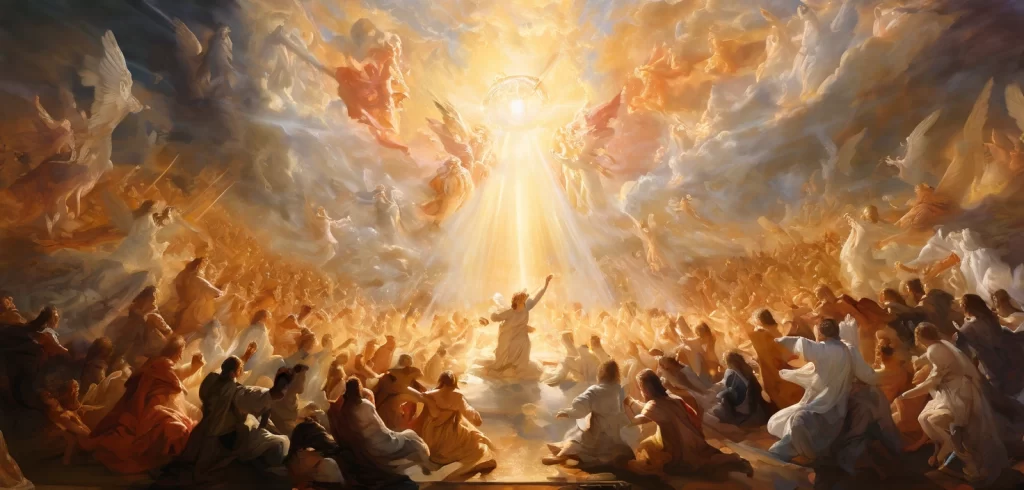
Angels are often described as messengers of God, heavenly emissaries who play fundamental roles in our existence. They are mentioned in many religious and cultural traditions, but it is in the sacred pages of the Bible that we find the most detailed and profound descriptions of their nature, origin, and purpose. Since the dawn of creation, when God proclaimed, “Let us make man in our image, after our likeness” (Genesis 1:26), angels have been an integral part of the human journey.
But who are these heavenly beings? Where did they come from? What is their purpose? And how do they interact with humanity? To answer these questions, we must delve into the depths of eternity, where God himself created them. The Bible offers us glimpses of this spiritual reality, revealing the existence of a complex celestial hierarchy, where angels perform specific and essential functions.
In this text, we will embark on a fascinating journey through Scripture, exploring the role of angels in the story of human redemption. We will witness their intervention in earthly affairs, understand their nature and hierarchy, and behold their heavenly glory. Along the way, we will see how angels have been agents of God, doing his bidding and influencing human events in ways that often go unnoticed.
The Origin and Nature of Angels
The Creation of Angels
The Bible teaches us that angels are beings created by God. They are not eternal entities like God, but were brought into existence at a specific time, even before the creation of the material world. Psalm 148:2-5 gives us a clue as to the origin of angels:
“Praise him, all his angels; praise him, all his hosts. Praise him, sun and moon; praise him, all you shining stars. Praise him, you heavens of heavens, and you waters that are above the heavens. Praise the name of the Lord, for he commanded, and they were created.”
Here we see that the angels, along with the heavens and the earth, were created by a direct command from God. They were called into existence by the divine word, before the creation of the physical universe.
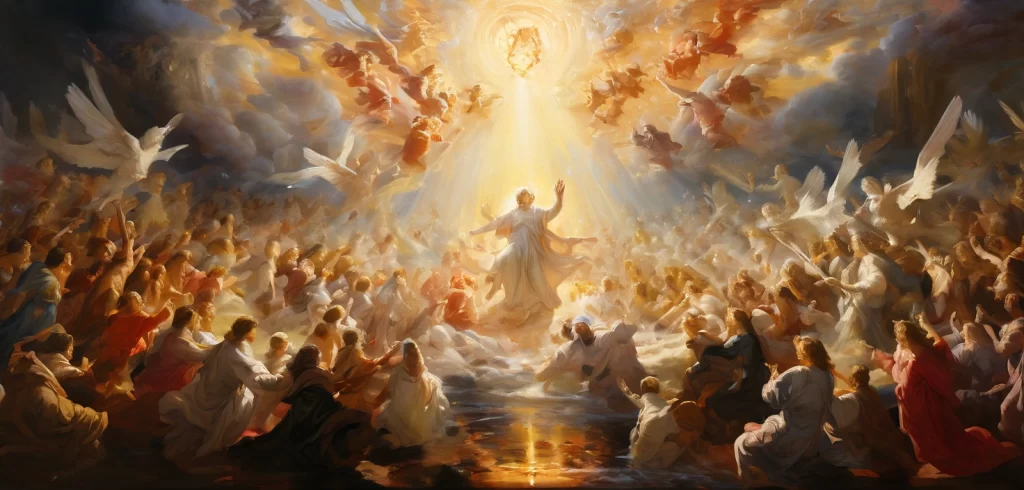
The book of Job also provides us with insights into the creation of angels. In Job 38:4-7, God asks Job:
“Where were you when I laid the foundations of the earth? Tell me, if you have understanding. Who laid its measures, if you know? Or who stretched the measuring line across it? On what were its bases fastened? Or who laid its cornerstone, when the morning stars sang together, and all the sons of God shouted for joy?”
In these words, God refers to the “sons of God” who were present during the creation of the world. Bible scholars generally interpret this expression as referring to the angels, who witnessed the creation and rejoiced in God’s work.
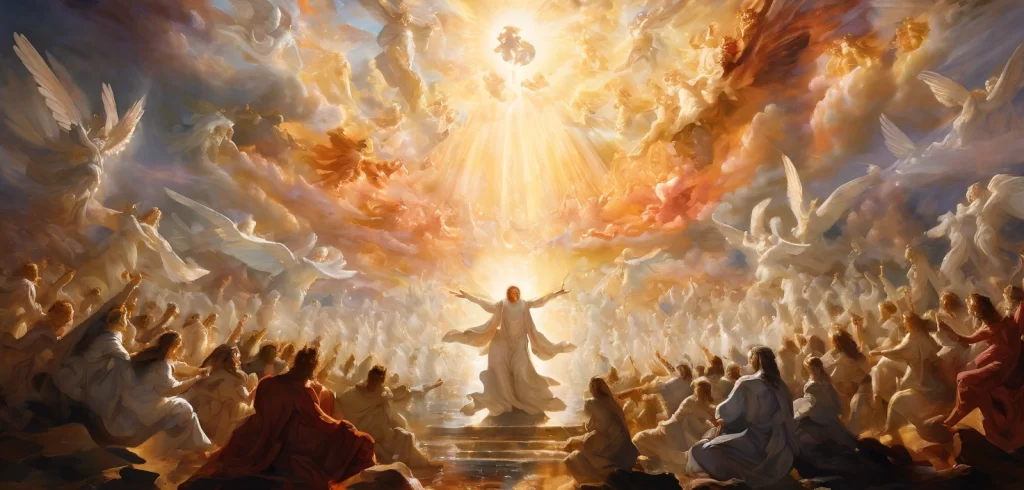
The Nature of Angels
Angels are spiritual beings, not possessing physical bodies like humans. The Bible describes them as “ministering spirits” (Hebrews 1:14), indicating that their existence is fundamentally different from ours. They are not subject to the limitations of time and space as we are, and their spiritual nature allows them to interact with the physical world in ways that defy our understanding.
Although angels are spirits, the Bible records that they can take on temporary human forms to manifest themselves to humans. For example, in Genesis 18, three angels appeared to Abraham as men, and in Luke 1, the angel Gabriel appeared to Mary as a man. These temporary appearances allowed angels to communicate directly with humans, conveying divine messages and carrying out God’s will.
The Hierarchy of Angels
The Bible reveals that there is a hierarchy among angels, with different ranks and functions. While Scripture does not provide a complete breakdown of this hierarchy, it does mention some specific classes of angels.
Archangels
Archangels are mentioned in several biblical passages and appear to occupy a leadership position among the angels. The best-known archangel is Michael, who is mentioned in Daniel, Jude, and Revelation. In Daniel 10:13, he is described as “one of the chief princes,” indicating his exalted position. In Jude 1:9, Michael is depicted disputing with the devil over the body of Moses, and in Revelation 12:7, he leads the angels in battle against Satan.
Gabriel, although not called an archangel in the Bible, is another angel of great importance. He is known for his appearances to Daniel (Daniel 8:16, 9:21) and Mary (Luke 1:26-38), where he conveys divine messages of great significance.
Cherubim
Cherubim are mentioned in several passages of the Old Testament, especially in association with the presence of God. In Exodus 25:18-22, God commands Moses to make two golden cherubim to be placed on the ark of the covenant, indicating that they are beings of great holiness and power. In Ezekiel 10, cherubim are described as winged creatures, full of eyes, that support the throne of God.
Cherubim are often associated with the protection and guardianship of sacred places. In Genesis 3:24, after Adam and Eve were expelled from the Garden of Eden, God placed cherubim to guard the entrance to the garden, symbolizing divine holiness and protection.
Seraphim
Seraphim are mentioned only in Isaiah 6:1-7, where the prophet has a vision of the Lord sitting on a high and exalted throne, with seraphim around him. They are described as winged creatures who cry out, “Holy, holy, holy is the Lord Almighty.” Seraphim appear to be involved in worship and proclaiming the holiness of God.
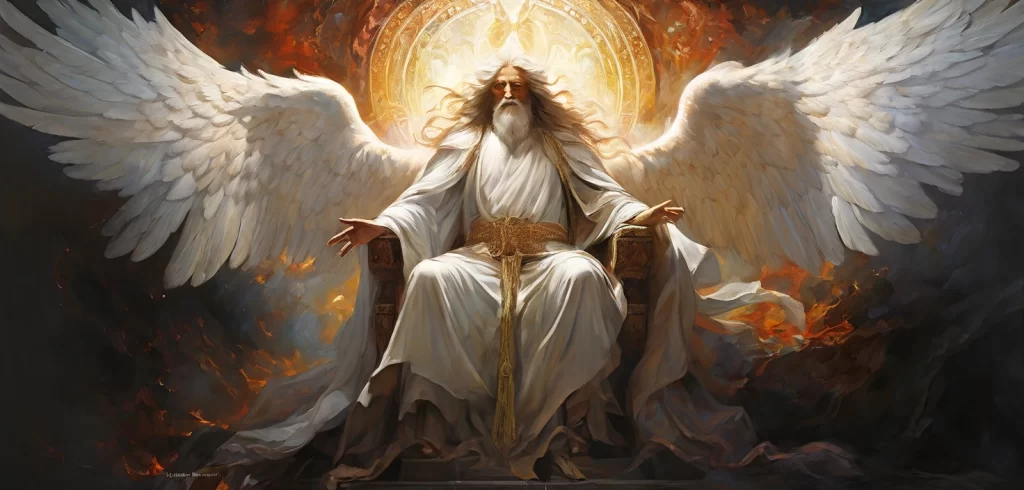
The Function of Angels
The primary function of angels is to serve and worship God. They are described as “ministering spirits, sent forth to minister for those who will inherit salvation” (Hebrews 1:14). Angels are God’s agents, doing his bidding and executing his will.
Divine Messengers
One of the most well-known functions of angels is as divine messengers. They are often sent to convey important messages from God to human beings. For example, Gabriel was sent to Mary to announce the birth of Jesus (Luke 1:26-38), and an angel appeared to Joseph in a dream to explain the virgin conception of Jesus (Matthew 1:20-21).
Protectors and Warriors
Angels also act as protectors and warriors. In Psalm 91:11-12, God promises to send angels to protect and guard those who trust in him. In Daniel 6:22, an angel shut the lions’ mouths to protect Daniel in the den. In Acts 12:7-11, an angel freed Peter from prison, demonstrating divine protection in times of danger.
In addition, angels are portrayed as heavenly warriors, fighting against the forces of evil. In Revelation 12:7-9, Michael and his angels battle Satan and his angels, driving them out of heaven.
Worshippers
Angels are described as perpetual worshipers of God. In Revelation 5:11-12, John sees a vision of myriads of angels surrounding the throne of God, singing praises and proclaiming the glory of God. The worship of angels reflects the heavenly order and reverence that permeates the spiritual realm.
The Interaction of Angels with Humanity
Angels and the Creation of Man
The interaction between angels and humans is an important part of the biblical narrative. Since the creation of man, angels have played a significant role in the history of humanity.
In Genesis 1:26, God says, “Let us make man in our image, according to our likeness.” The presence of the plural (“let us make”) suggests that God may have consulted with the heavenly hosts, including the angels, about the creation of man. Although the Bible does not provide specific details about this interaction, it is possible that angels witnessed the creation of man and were involved in the divine plan.
Angels and the Patriarchs
Abraham
One of the earliest and most significant encounters between angels and humans occurred in the life of Abraham. In Genesis 18, Abraham is visited by three men who are later identified as angels. They bring the promise that Abraham and Sarah will have a son, despite Sarah’s advanced age. This promise not only confirms God’s faithfulness but also reveals the direct interaction between angels and humans.
In Genesis 19, two of the angels who visited Abraham go to Sodom to rescue Lot and his family before the city’s destruction. The presence of angels demonstrates divine intervention and protection of the righteous.
Jacob
In Genesis 32, Jacob has a remarkable encounter with an angel. During the night, a man appears and wrestles with Jacob until dawn. At the end of the wrestling match, the man blesses Jacob and changes his name to Israel, indicating that he has prevailed. This episode is often interpreted as an encounter with an angel, symbolizing Jacob’s spiritual struggle and divine blessing.

Angels and Moses
Moses’ life was profoundly marked by the direct intervention of angels. In Exodus 3, God manifests himself to Moses through the burning bush, and an angel is mentioned as part of this experience. In Exodus 14, angels are described as agents of the liberation of the Israelites from Egypt, guiding and protecting them. In Exodus 23:20-23, God promises to send an angel to guide and protect the Israelites:
“Behold, I am sending an angel before you to guard you on the way and to bring you to the place I have prepared for you. Beware of him, and obey his voice. Do not resist him, for he will not pardon your transgression, for my name is in him. But if you listen to his voice and do all that I say, then I will be an enemy to your enemies and an adversary to your adversaries. For my angel will go before you and bring you to the Amorites, the Hittites, the Perizzites, the Canaanites, the Hivites, and the Jebusites; and I will destroy them.”
Angels and the Ministry of Jesus
The life and ministry of Jesus were marked by the constant presence of angels. At the birth of Jesus, an angel announced the event to the shepherds (Luke 2:8-14), and a multitude of angels praised God, proclaiming peace on earth (Luke 2:15-20).
During Jesus’ ministry, angels appeared at crucial moments. In Matthew 4:11, after Jesus resisted Satan’s temptations, angels came and ministered to him. In Matthew 26:53, Jesus mentions that he could ask God to send more than twelve legions of angels to protect him, indicating the readiness of angels to carry out God’s will.
Angels and the Apostle Paul
The apostle Paul also had experiences with angels. In Acts 27:23-24, he reports that an angel appeared to him during a storm at sea, assuring him that he would stand before Caesar. In 2 Corinthians 11:14, Paul mentions that Satan disguises himself as an angel of light, indicating the possibility of deception by fallen angels.
Angels and the End Times
The Bible reveals that angels will play important roles in the events leading up to the end of time. In Matthew 13:39, Jesus mentions that angels will be the reapers at the final judgment, separating the righteous from the wicked. In Matthew 24:31, Jesus states that angels will be sent to gather the elect in the last days.
In Revelation, angels are described as agents of divine justice, executing God’s judgments. In Revelation 7:1-3, angels hold the four winds of the earth, indicating divine control over future events. In Revelation 8-9, angels are sent to execute the seven seals and seven trumpets, announcing God’s judgments.
Spiritual Warfare and the Fall of Lucifer
Lucifer’s Rebellion
The Bible reveals that there was a rebellion in heaven, led by an angel named Lucifer. In Isaiah 14:12-15, the prophet describes the fall of Lucifer:
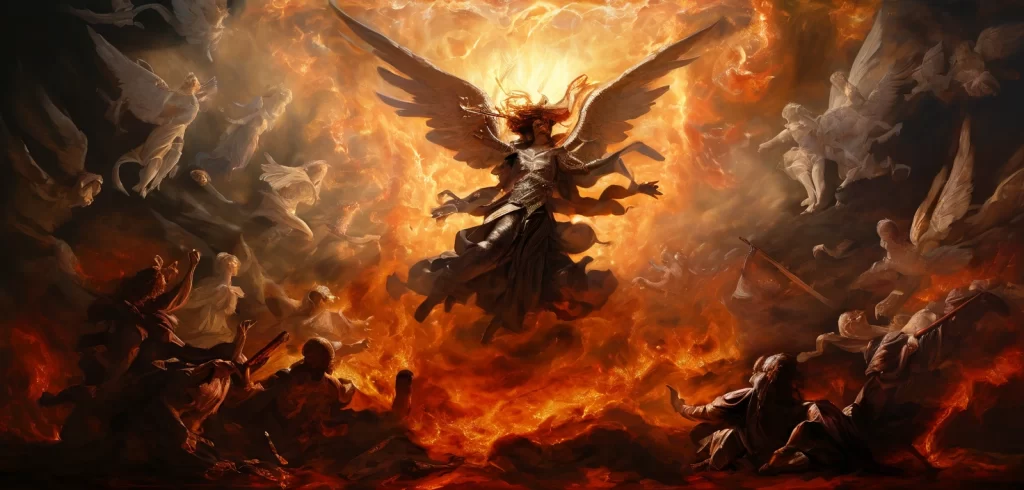
“How you have fallen from heaven, O Lucifer, son of the morning! How you are cut down and thrown to the ground, you who weakened the nations! For you said in your heart, ‘I will ascend into heaven! I will exalt my throne above the stars of God! I will sit enthroned on the mount of assembly, in the farthest parts of the north! I will ascend above the heights of the clouds; I will be like the Most High!’ But you are brought down to the pit, to the sides of the pit.” In Ezekiel 28:12-19, Lucifer’s fall is described in terms of a king of Tyre, but biblical scholars understand the description to apply to Lucifer. He is described as an anointed cherub, full of wisdom and beauty, who became corrupt because of his pride and desire for power.
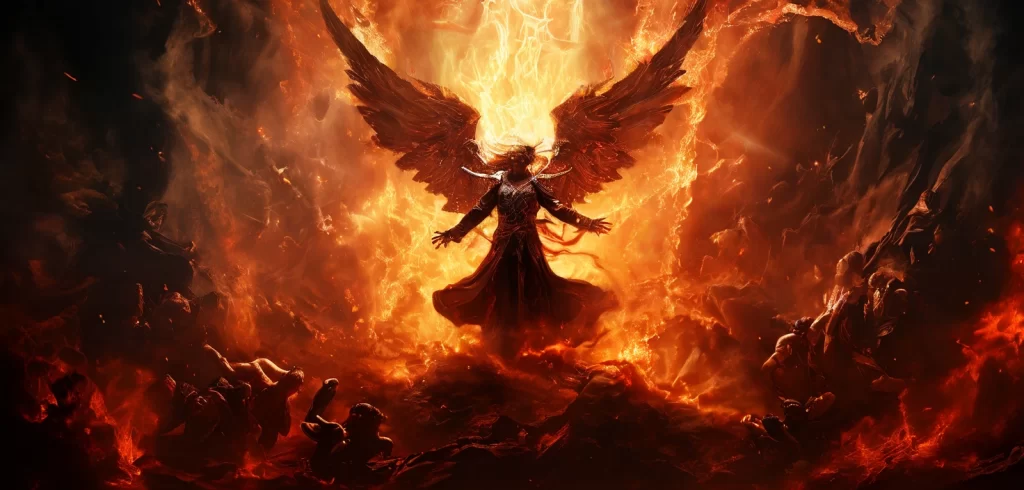
The Fall of the Angels
Lucifer’s rebellion led to the fall of many angels. In Revelation 12:7-9, the heavenly battle is described:
“And there was war in heaven: Michael and his angels fought against the dragon; and the dragon and his angels fought, and prevailed not, neither was their place found any more in heaven. And the great dragon was cast out, that ancient serpent, called the Devil, and Satan, which deceiveth the whole world: he was cast out to the earth, and his angels were cast out with him.”
The fall of Lucifer and his angels resulted in the creation of the kingdom of darkness, which is opposed to the kingdom of God. The fallen angels, also known as demons, continue to fight against God and attempt to lead human beings away from the path of salvation.
The Spiritual Battle
The fall of Lucifer and the rebellion of the fallen angels began the spiritual battle that permeates the unseen world. The Bible reveals that fallen angels continue to try to influence humanity by promoting sin and disobedience to God. In 1 Peter 5:8, Peter warns:
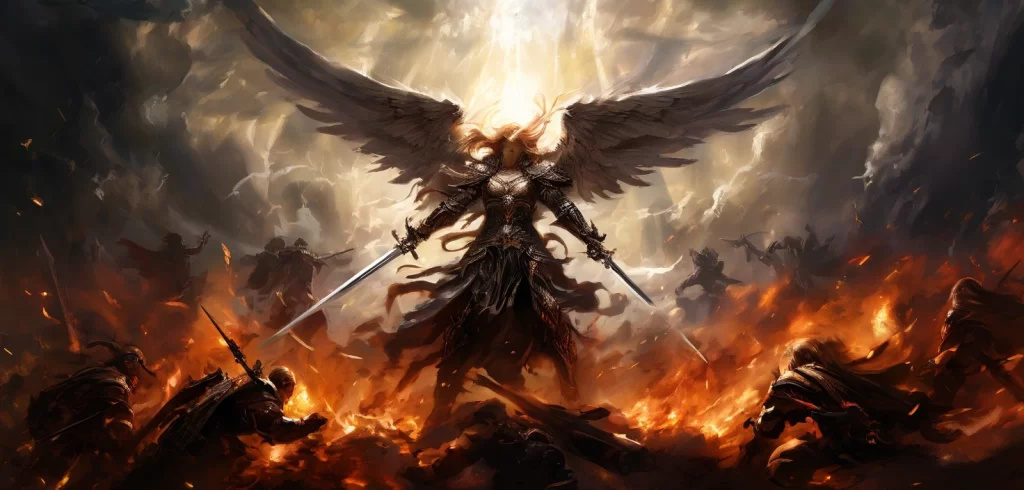
“Be sober, be vigilant. Your adversary the devil prowls around like a roaring lion, seeking someone to devour.” In Ephesians 6:12, Paul describes the nature of spiritual warfare: “For we wrestle not against flesh and blood, but against principalities, against powers, against the rulers of the darkness of this world and against spiritual wickedness in high places.” Spiritual warfare is real and intense, and angels play a crucial role in protecting the righteous and carrying out God’s will.

The Importance of Angels to Humanity
The Protection and Guidance of Angels
The Bible teaches that angels are sent by God to protect and guide human beings. In Psalm 91:11-12, God promises:
“For he will give his angels charge over you, to guard you in all your ways. They will bear you up in their hands, so that you will not dash your foot against a stone.”
In Daniel 6:22, the angel of the Lord shut the lions’ mouths to protect Daniel in the den. In Acts 12:7-11, an angel freed Peter from prison, demonstrating divine intervention in times of danger.
The Worship and Glory of God
Angels are creatures who worship God unceasingly. In Revelation 5:11-12, John has a vision of myriads of angels surrounding the throne of God, singing praises and proclaiming the divine glory. The worship of angels reflects the heavenly order and reverence that permeates the spiritual realm.
The presence of angels reminds us of the majesty and glory of God, and inspires us to worship Him with our whole being.
Executing the Divine Will
Angels are God’s agents, carrying out His orders and executing His will. They are sent to convey divine messages, protect the righteous, fight against the forces of evil, and execute God’s judgments.
In Matthew 13:41-42, Jesus mentions that angels will be sent to separate the righteous from the wicked at the end of time. In Revelation 8-9, angels are sent to execute the seven seals and seven trumpets, announcing God’s judgments.
Inspiration for the Christian Life
The existence and activity of angels inspire us to live a faithful and dedicated Christian life. The presence of angels reminds us of the reality of the spiritual world and the importance of remaining steadfast in the faith.
The spiritual battle that angels wage against the forces of evil teaches us to be vigilant and sober, resisting temptation and fighting against sin. The protection and guidance of angels encourages us to trust in God and follow his ways.
The worship of angels inspires us to praise God and proclaim his glory. The execution of divine will by angels reminds us of God’s sovereignty and our calling to fulfill his will in our lives.
The Influence of Angels on Culture and Art
In addition to their presence in Scripture, angels have also left a profound mark on culture and art throughout the centuries. The image of angels as winged beings, bearers of divine messages and symbols of protection and hope, permeates many religious and cultural traditions.
Angels in Art
Religious art, from medieval times to the modern era, is replete with depictions of angels. Paintings, sculptures, and stained glass windows often depict angels in biblical scenes, such as the announcement of the birth of Jesus, the expulsion of Adam and Eve from the Garden of Eden, and the resurrection of Christ.
Renaissance artists such as Michelangelo and Raphael created masterpieces that capture the beauty and majesty of angels. Michelangelo, in his painting on the ceiling of the Sistine Chapel, depicted angels as powerful, ethereal beings, witnesses to creation and redemption. Raphael, in his painting “The Sistine Madonna,” presents angels as serene, protective figures watching over the sacred scene.
Angels in Literature and Music
Literature and music have also been influenced by the figure of angels. Poets and writers, from Dante Alighieri in “The Divine Comedy” to John Milton in “Paradise Lost,” have explored the nature and role of angels in their works. Milton, in particular, devotes much of his epic to describing Lucifer’s rebellion and the fall of the angels, exploring themes of pride, ambition, and redemption.
In music, angels are frequently mentioned in hymns and religious songs, extolling their worship of God and their protection of human beings. Classical composers, such as Handel in “Messiah” and Bach in his cantatas, incorporated the imagery of angels into their compositions, evoking the glory and majesty of the heavenly realm.
Angels and the Human Experience
Belief in angels and their interaction with humanity has been a source of comfort and hope for many people throughout history. The idea that there are spiritual beings who protect, guide, and intercede for us before God is comforting in times of difficulty and uncertainty.
Angels as Messengers of Hope
In times of despair and distress, belief in angels can bring hope and solace. The story of Hagar, told in Genesis 21:15-19, is an example of this. Hagar, exiled in the desert with her son Ishmael, is about to die of thirst. God hears Ishmael’s cry and sends an angel to comfort Hagar and show her a spring of water. The angel tells her, “Do not be afraid, for God has heard the voice of the boy, and he is there. Arise, pick up the boy and take him by the hand, for I will make him into a great nation” (Genesis 21:17-18). This experience demonstrates how angels can bring hope and relief in desperate situations.
Angels as Protectors
The belief in guardian angels is common in many cultures and religious traditions. The idea that a guardian angel is always by our side, protecting and guiding us, brings comfort and security. This belief is based on biblical passages such as Psalm 91:11-12, which states that God sends angels to guard those who trust in him.
In Matthew 18:10, Jesus says, “Take heed that you do not despise one of these little ones, for I tell you that in heaven their angels always see the face of my Father in heaven.” This passage suggests that each person has a guardian angel who intercedes on their behalf before God.
Angels as Messengers of Guidance
Angels are also seen as messengers of divine guidance. In several biblical passages, angels appear to guide, counsel, and warn human beings. For example, in Genesis 31:11-13, an angel appears to Jacob in a dream, telling him to return to the land of his fathers. In Matthew 1:20-21, an angel appears to Joseph in a dream, instructing him to accept Mary as his wife and to raise the son she will bear.
Belief in angels who guide and counsel us can help us make wise decisions and follow the path God desires for us.
The Intercession of Angels
The idea that angels intercede for us before God is another important aspect of belief in angels. In Revelation 8:3-4, John sees an angel standing before the altar, offering the prayers of the saints to God:
“And another angel came and stood at the altar, having a golden censer; and there was given to him much incense, that he should offer it with the prayers of all the saints upon the golden altar which was before the throne. And the smoke of the incense, together with the prayers of the saints, ascended before God from the angel’s hand.”
This passage suggests that angels play a role in the intercession of human prayers before God. Belief in the intercession of angels can give us confidence that our prayers are being heard and answered.
The Worship of Angels
The worship of angels is an important theme in the Bible. In Revelation 5:11-12, John describes a vision of myriads of angels surrounding the throne of God, singing praises and proclaiming the glory of God:
“Then I saw and heard the voice of many angels around the throne and the living creatures and the elders, and their number was ten thousand times ten thousand and thousands of thousands, saying with a loud voice, ‘Worthy is the Lamb who was slain to receive power and riches and wisdom and strength and honor and glory and blessing.’”
The worship of the angels reflects the heavenly order and reverence that permeates the spiritual realm. The vision of the angels’ worship inspires us to praise God and acknowledge His majesty and glory.
The Lesson of the Fallen Angels
The fall of Lucifer and the fallen angels teaches us important lessons about sin, pride, and rebellion. The story of Lucifer, once an anointed cherub who fell because of his pride and desire for power, is a sobering reminder of the dangers of disobedience to God.
Lucifer’s rebellion and the fall of the fallen angels warn us about the destructive nature of sin and the importance of remaining faithful to God. Their story teaches us to resist temptation, to be humble, and to trust in God’s grace and forgiveness.
The Hope of Redemption
Belief in angels also brings us hope of redemption. The Bible teaches us that despite the fall of Lucifer and the rebellion of the fallen angels, God continues to work in our world and in our lives. He sent his Son, Jesus Christ, to redeem humanity and restore divine order.
Angels played an important role in the story of redemption, announcing the birth of Jesus, protecting him during his ministry, and witnessing his resurrection. The presence of angels reminds us of God’s faithfulness and His promise of redemption.
The Glory of Angels and the Sovereignty of God
The journey through Scripture has revealed to us the reality of angels, heavenly beings created by God to serve and worship Him. They are messengers, protectors, warriors, and worshipers, playing key roles in human history.
The interaction between angels and humans is an important part of the biblical narrative, and the presence of angels reminds us of the reality of the spiritual world and the importance of living a life of faith and obedience to God.
The spiritual battle between angels and the forces of evil teaches us to be vigilant and sober, resisting temptation and fighting against sin. The protection and guidance of angels encourages us to trust in God and follow His ways.
Tags:
angels, heavenly messengers, divine protectors, Bible, spiritual realm, hierarchy of angels, archangels, cherubim, seraphim, fallen angels, Lucifer, Gabriel, Michael, angels and humans, angels in art, angels in literature, angels in music, angels in culture, angels and creation, angels and the patriarchs, Abraham o, Jacob, Moses, angels, and Jesus, angels and the end of time, spiritual warfare, angel worship, angels and redemption, angels and divine protection, angels and divine guidance, angels and intercession, angels and the glory of God, angels and the sovereignty of God, angels and free will, angels and the fall, angels and the rebellion, angels and hope, angels and faith, angels and pop culture, angels and renaissance art, angels and classical music, angels and epic literature, angels and theology, angels and philosophy, angels and spirituality, angels and everyday life, angels and personal protection, angels and personal guidance, angels and personal hope, angels and personal faith, angels and personal redemption, angels and personal spiritual warfare, angels and God’s sovereignty in personal life, angels and the fall of Lucifer, angels and the rebellion of angels, angels and the hope of redemption, angels and heavenly glory, angels and eternity, angels the and perpetual worship, angels and the heavenly order, angels and the divine hierarchy, angels and the creation of man, angels and the expulsion from paradise, angels and God’s promise, angels and the divine covenant, angels and the deliverance from Egypt, angels and the exodus, angels and the conquest of the Promised Land, angels and the ministry of and Jesus, angels and the temptation of Jesus, angels and the crucifixion of Jesus, angels and the resurrection of Jesus, angels and the birth of Jesus, angels and the annunciation, angels and the visitation, angels and the childhood of Jesus, angels and the life of Jesus, angels and the second coming of Jesus, angels and the final judgment, angels and the comparison of the wheat and the tares, angels and the battle of Armageddon, angels and the new Jerusalem, angels and eternity with God, angels and the glory of God revealed, angels and the majesty of God, angels and the holiness of God, angels and the mercy of God, angels and the justice of God, angels and the faithfulness … and the grace of God, angels and the love of God, angels and the presence of God, angels and the will of God, angels and the word of God, angels and Bible prophecy, angels and the end of the world, angels and the hope of heaven, angels and the afterlife, angels and eternity, angels and the dwelling place of God, angels and eternal glory.



